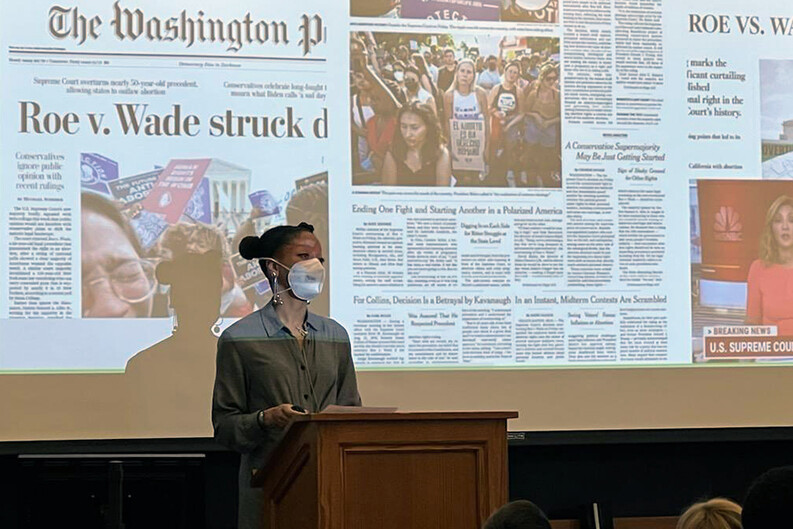Khiara Bridges Discusses Her Harvard Law Review Foreword, “Race in the Roberts Court”

The Solomon Center for Health Law and Policy4 welcomed Khiara M. Bridges5, Professor of Law at UC Berkeley School of Law on Feb. 2 to present a talk, “Race in the Roberts Court: Dobbs v. Jackson Women’s Health Organization.”
At the heart of Bridges’ presentation was “Race in the Roberts Court6,” her foreword in the November 2022 Harvard Law Review. In this foreword, Bridges calls for experts, scholars, and advocates to pay attention to what the court is doing. She offers analysis of cases that demonstrate what she describes as inconsistent and unnuanced reasoning the court has offered in support of its decisions to not prevent discrimination and racism. She describes how the court has repeatedly used interpretations of law such as the disparate impact doctrine to shift its perspective on large-scale racism like eugenics and genocide. Instead, she writes, the court offers deference to white claimants’ arguments.
Bridges began the talk by proposing that the Roberts court has adopted a theory of racism that sees racism as an objective fact: what she calls “racial common sense.” In this view, she explained, the court identifies something as “racism” when it looks like racism did the in the pre-civil rights era. She offered examples of how white people protected white supremacy, and the forms that white supremacy took. These include, according to Bridges, inequitable legal and judicial systems, vote nullification, Japanese internment camps, and literacy tests and poll taxes, to name a few.
According to Bridges, the court seems to be proceeding in two ways. First, if it has determined the behavior or harm in question bears a resemblance to a harm in the pre-civil rights era, then the court provides relief. If the court does not find a resemblance, it does not provide relief. Following this approach, the court fails to examine, or even acknowledge, the complexity and context for present-day racism and inequality, according to Bridges.
Bridges emphasized that the court’s view of race helps to explain its decision in Dobbs. She noted that conservative arguments that abortion is a form of genocide and a tool of eugenics resonated with the Roberts court. “Genocide and eugenics are classic — indeed, paradigmatic — forms of racist violence practiced during the pre-civil rights era,” she writes in the forward. Because the court could see a resemblance between genocide and black people’s higher rates of abortion, the court remedied the “injury” by reading abortion rights out of the Due Process Clause, Bridges explained. She also addressed the opinions of Justice Thomas, saying that they often contradict or are irrelevant to his claim of being an originalist.
Bridges also discussed the role that the media and others online play in explaining and analyzing the court’s decisions. She cautioned against simple explanations. Instead, she encouraged everyone to explore the larger and lasting impact these decisions will have on society and American law.


